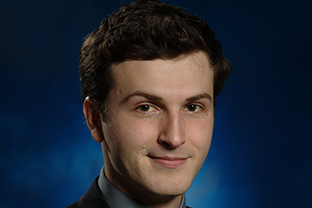January 13, 2017
SVSU student wins top honor in national collegiate courtroom competition

Gabe Klotz, a political science major from Midland, delivered an inspired performance and received the national title in oration at the association’s national championship competition at Stetson University College of Law in Gulfport, Florida Jan. 6-7. He bested 159 competitors from top universities across the United States who had qualified for the competition.
Klotz earned an invitation to the tournament after performing well with SVSU’s moot court program during a regional competition at SVSU in December. This was Klotz’s first academic year competing in moot court, where students act as attorneys in teams of two. They make arguments to a panel of judges by drawing from constitutional law and Supreme Court cases. Judges then decide winners based on public speaking ability, knowledge of cases and of law, and the ability to answer questions.
“This is a significant accomplishment,” said Julie Keil, an SVSU assistant professor of political science and Klotz’s moot court program advisor. “That’s a huge thing. One year, we had a student who placed No. 14 in that category, but that’s as high as we reached previously.”
Keil said Klotz received notice he should attend the tournament’s closing banquet, where the American Moot Court Association announces the top winner for the contest’s three categories: the overall team competition award as well as individual awards for oration and brief writing.
“When he was invited to the banquet, he thought he might have placed No. 19 or 20, so earning No. 1 was a surprise to him,” Keil said. “As they were announcing the top three, he assumed someone made a mistake when they told him he placed high. Then they announced his name. That was exciting.”
Klotz earned the ranking — and a trophy — based on a composite score determined by judges observing Klotz’s presentation. The score was based on speaking ability, demeanor and knowledge of the courtroom case being discussed. Klotz won by the narrowest of margins; he earned a 382.5 score, edging the next-closest competitor’s 382.3 score.
Klotz’s moot court teammate was Jrew Brickel, a criminal justice major from Midland.
SVSU’s moot court program, founded seven years ago by Keil, is ranked No. 20 in the nation. That ranking does not reflect this month’s competition. Keil expects the new rankings will be revealed in July.
Keil said the competition was stiff for the eight SVSU students who earned invitations to the tournament.
Of SVSU’s four tandems, the duo with the highest team competition score placed No. 49 out of the 80 teams. That distinction belonged to teammates Connor Hughes, a political science major from Howell, and Madison Laskowski, a political science major from Bay City. Both earned invitations to the national tournament by placing No. 1 during a regional competition in Chicago last year.
Teams from Patrick Henry College in Virginia and the United States Air Force Academy earned the national competition’s No. 1 and No. 2 team awards, respectively.
“There were some very prestigious universities there,” Keil said. “The competition gets harder every year, as moot court becomes more popular.”
SVSU’s other representatives at the tournament included the teams of Allison Fuller, a political science major from Davison, and Nancy Haddad, a communication major from Saginaw; and political science majors Eric Maul of Lupton, and Joshua Hoebeke of West Branch.
More than 350 colleges and universities field American Moot Court Association teams. Each year, American Moot Court Association organizers create a single fictional U.S. Supreme Court case — often based on actual cases heard in lower courts — that competitors must address when participating in the regional and national tournaments.
This year’s case study concerned voter rights. The case specifically dealt with a citizen who divorced her husband, changed her name but did not update her ID documents in time for the election. As a result, clerk employees did not allow the citizen to vote because her ID did not match the voting registry.
For more information on the American Moot Court Association, visit www.acmamootcourt.org/.
